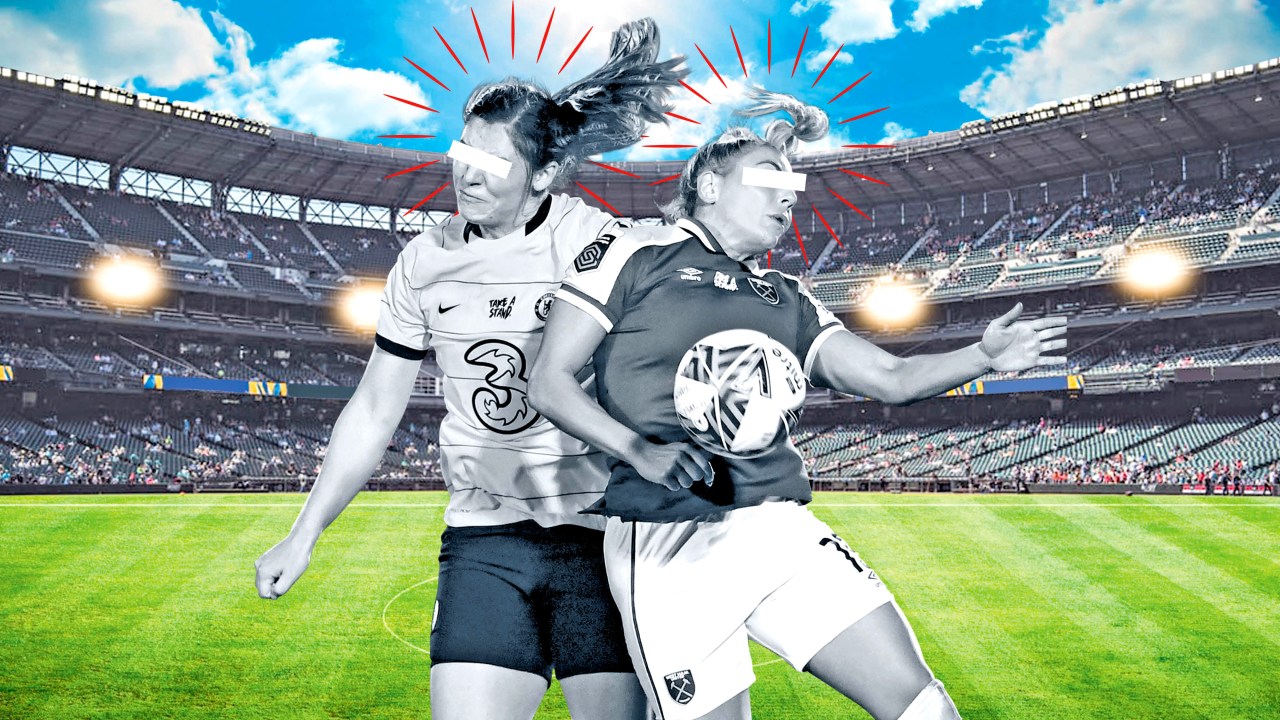
Head knocks have made headlines in men’s sport for years, now, a new conversation has started. Here’s what you need to know.
When 28-year-old AFLW star Heather Anderson passed away last November, the sporting community was devastated. An army medic who moved from her hometown in the Top End to play for the Adelaide Crows – taking home the premiership trophy in the league’s inaugural season – she’s since become the first known professional female athlete to be diagnosed with a brain disease linked to concussion and head knocks.
“It was a surprise, but not a surprise,” Anderson’s father, Brian, told ABC’s 7:30, acknowledging his daughter had been involved in high-contact sports from a young age. “I think now that this report has been published, I’m trying to think about how it might play out for female sportspeople everywhere.”
Like what you see? Sign up to our bodyandsoul.com.au newsletter for more stories like this
Having taken her own life, Anderson’s family donated her brain to research, with the Australian Sports Brain Bank’s report – released in July – concluding the young star suffered from chronic traumatic encephalopathy (CTE), a condition that causes a decline in brain function and is also linked to poor mental health, irrational behaviour and suicidal ideation.
Just two weeks after the findings, Matildas players Mary Fowler and Aivi Luik both sat out of a Women’s World Cup match after sustaining a mild concussion in the same training session. The Australian guidelines have a strict ruling that assures all players suffering a head knock are to be ruled out of competition for a minimum of six days to monitor their health.
However, all brain impacts – not just concussions – need to be taken seriously.
“CTE risk is due to repetitive impacts to the brain that don’t result in concussion,” explains Professor Alan Pearce, who co-authored the report on Anderson.
“The bumps, tackles and collisions that we call sub-concussions can be detrimental,” he says. “In Heather Anderson’s case study, there was only one clinically diagnosed concussion and possibly four unreported concussions. But her playing career was over 17 years. That [longevity] is the main concern for CTE.”
There’s emerging evidence that women are more at risk of concussion than men – although the jury is out on whether this is purely down to biology.
“In comparable sports, women are twice as likely to sustain a sport-related concussion than men,” confirms Shreya McLeod, a lecturer in physiotherapy at the Australian Catholic University and a researcher on concussion in women’s contact sports. “Some studies also show women take an average of six to 20 days longer to recover than men.”
She adds: “There are fundamental differences between men and women – anatomically, physiologically and in the way they tackle, contest a mark or head the ball. Physical factors such as shorter neck dimensions, smaller head mass and narrower neck girth result in reduced neck strength in women. This predisposes women to greater head-neck acceleration during impacts.”
However, there are also sociological reasons that may point to why female concussion is on the rise. “Women tend to be more aware of their symptoms and are more likely to report them,” says McLeod.
Pearce adds: “Testing for concussion is subjective; players have to rate their symptoms from mild to severe. Male players predominantly downplay their symptoms. They don’t want to be seen as weak, or be perceived as letting the team down. Female players tend to be more honest. They are just as committed to winning, but recognise it’s better for the team if they step out and let a fresh player come in.”
After years of fighting to be taken seriously in contact sports, understanding head injuries shouldn’t be about discouraging women from playing. Instead, it needs to afford them with the same training and depth of scientific research that men are given.
“Smarter, strategic coaching is a good start,” says Pearce. For the rest of us who enjoy playing, or watching our kids and grandkids play, weekend sport, there’s one simple rule to abide by: “If in doubt, sit it out,” says Pearce.
“Report symptoms and don’t downplay them. Erring on the side of caution could give you longer brain health and a better quality of life.”